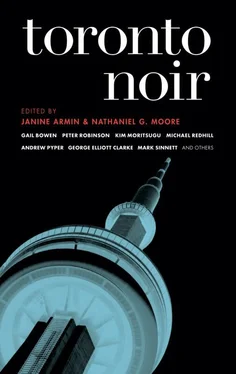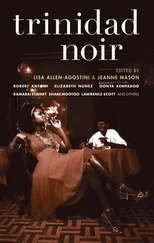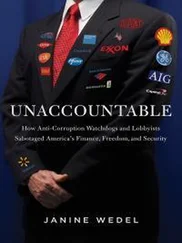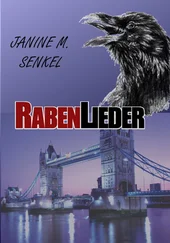And so life went on, waiting, waiting for the time when he could decently, and without arousing suspicion, make his move. The policeman didn’t return, obviously realizing that he had no chance of making a case against Lloyd without a confession, which he knew he wouldn’t get. It was late November now, arguably one of the grimmest months in Toronto, but at least the snow hadn’t come yet, just one dreary gray day after another.
One such day Lloyd stood on the crowded eastbound platform at the St. George subway station wondering if he dare make his move as early as next week. At least, he thought, he could “go away for a while,” maybe even until after Christmas. Surely that would be acceptable by now? People would understand that he couldn’t bear to spend his first Christmas without Laura in Toronto.
He had just decided that he would do it when he saw the train come tearing into the station. In his excitement at the thought of seeing Anne-Marie again so soon, a sort of unconscious sense of urgency had carried him a little closer to the edge of the platform than he should have been, and the crowds jostled behind him. He felt something hard jab into the small of his back, and the next thing he knew, his legs buckled and he pitched forward. He couldn’t stop himself. He toppled in front of the oncoming train before the driver could do a thing. His last thought was of Anne-Marie waving goodbye to him at Vancouver International Airport, then the subway train smashed into him and its wheels shredded him to pieces.
Someone in the crowd screamed and people started running back toward the exits. The frail-looking old man with the walking stick who had been standing directly behind Lloyd turned to stroll away through the chaos, but before he could get very far, two scruffy-looking young men emerged from the throng and took him by each arm. “No you don’t,” one of them said. “This way.” And they led him up to the street.
Detective Bobby Aiken played with the worry beads one of his colleagues had brought him back from a trip to Istanbul. Not that he was worried about anything. It was just a habit, and he found it very calming. It had, in fact, been a very good day.
Not because of Lloyd Francis. Aiken didn’t really care one way or another about Francis’s death. In his eyes, though he hadn’t been able to prove it, Francis had been a cold-blooded murderer and he had received no less than he deserved. No, the thing that pleased Aiken was that the undercover detectives he had detailed to keep an eye on Francis had picked up Mickey the Croaker disguised as an old man at the St. George subway station, having seen him push Francis with the sharp end of his walking stick.
Organized Crime had been after Mickey for many years now but had never managed to get anything on him. They knew that he usually worked for one of the big crime families in Montreal, and the way things were looking, he was just about ready to cut a deal: amnesty and the witness relocation plan for everything he knew about the Montreal operation, from the hits he had made to where the bodies were buried. Organized Crime were creaming their jeans over their good luck. It could mean a promotion for Bobby Aiken.
The only thing that puzzled Aiken was why? What had Lloyd Francis done to upset the mob? There was something missing, and it irked him that he might never uncover it now that the main players were dead. Mickey the Croaker knew nothing, of course. He had simply been obeying orders, and killing Lloyd Francis meant nothing more to him than swatting a fly. Francis’s murder was more than likely connected with the post-production company, Aiken decided. It was well-known that the mob had its fingers in the movie business. A bit more digging might uncover something more specific, but Aiken didn’t have the time. Besides, what did it matter now? Even if he didn’t understand how all the pieces fit together, things had worked out the right way. Lanagan and Francis were dead and Mickey the Croaker was about to sing. It was a shame about the wife, Laura. She was a young, good-looking woman, from what Aiken had been able to tell, and she shouldn’t have died so young. But those were the breaks. If she hadn’t being playing the beast with two backs with Lanagan in her own bed, for Christ’s sake, then she might still be alive today.
It was definitely a good day, Aiken decided, pushing the papers aside. Even the weather had improved. He looked out of the window. Indian summer had come to Toronto in November. The sun glinted on the apartment windows at College and Yonge, and the office workers were out on the streets, men without jackets and women in sleeveless summer dresses. A streetcar rumbled by, heading for Main station. Main. Out near the Beaches. The boardwalk and the Queen Street cafés would be crowded, and the dog-walkers would be out in force. Aiken thought maybe he’d take Jasper out there for a run later. You never knew who you might meet when you were walking your dog on the beach.
Numbskulls
by George Elliott Clarke
East York
Bad men? No, not really. But they were no good. Or they were good-for-nothing ne’er-do-wells. Three goofs.
As one might expect, their childhoods were good for adult-only nightmares. Their parents were ratty in style and snaky by nature. Their dads’ mouths were only half-toothed: The rest had been punched or kicked loose and lost. Their moms had craved abortions, but, addled, had said, “Ablutions,” and had been served a lot of alcohol instead. Not as bad as thalidomide, but not helpful either.
The East Coast trio’s pernicious sociology provides only dismal insight into the disgusting episode of savagery perpetrated in East End Toronto last May. Not even the excuse of primitivism mitigates the horror and stench of the crime, the abomination the three Nova Scotians wrought.
The names of the ex-Haligonians — once sailors turned truckers, who had migrated to East York following their dismissals from Her Majesty’s Royal Canadian Navy — will not be forgotten by anyone alert to the reality of monsters. Bruno Bellefontaine, 25, Peter Purdy, 34, and Scott “Scalpel” McAlpine, 27, were turfed from the naval service because they were constantly sinking in rum. Disordered by drink, they disobeyed orders. The three tough guys, muscular bullies, made better boxers and wrestlers than they did seamen. They swore an oath to The Queen, yes, but they swore constantly at their officers too.
(Their officers had hoped to ship the trio to Afghanistan, to be shot down or blown up by the irregulars of the opium warlords. Unfortunately, as shipbound sailors, they would have faced little danger from either narco-terrorists or Islamist drug smugglers. Indeed, plenty of other Canucks were being dynamited and decimated, all without even an apologetic letter from The Queen, but it was quite impossible to ensure the same fate for the water-borne warriors.)
Following their jettisoning from Her Majesty’s service, just last September, the three men drifted into the hard-driving, high-pay trade of trucking. Wanting to “get the hell out of the lousy Maritimes,” where they were infamous for brawls and extra-toxic intoxication and for getting punched out in every grotty pub or murky tavern in which they exposed their mugs, they eagerly enlisted with Great Lakes — Atlantic Ocean. They began transporting goods among the spaced-out (distant) cities of Halifax, Montreal, Toronto, Windsor, and Thunder Bay.
The three boys loved the job, but could not steer clear of the sauce. They had the awful habit of spiking their coffee thermoses with Pusser’s Navy Rum. To drive, just a little drunk, was okay, for it kept them pepped up, making their rigs smoke nonstop from payload to payload.
Off the road, the guys bunked in Toronto. It was terrific: not very French, not very English either. It was a fine place to unwind.
Читать дальше












